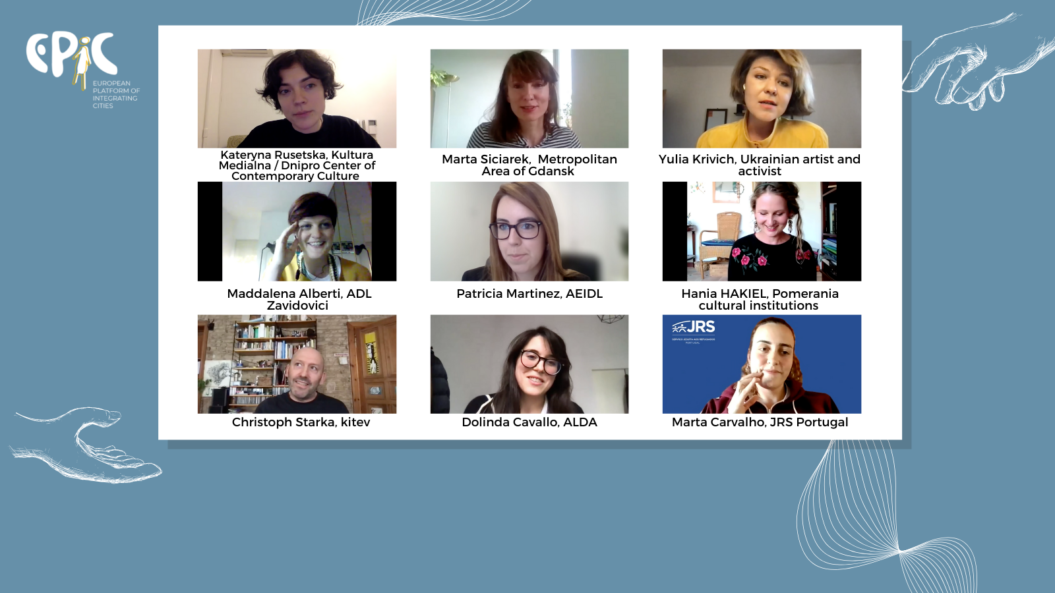
“From emergency reception to an inclusive and sustainable response: the narrative of a human-based system to welcome refugees from Ukraine”.
SCROLL DOWN TO WATCH THE VIDEO
Continuing a series of webinars examining the power of narrative both to combat divisive and hateful discourses and to enable inclusive policy-making, EPIC hosted, on April 13, 2022, a 3rd webinar to re-examine these issues in the context of the war in Ukraine.
United in their support of the millions of people fleeing Ukraine, citizen-led and other local initiatives in neighbouring countries, have led the way in emergency solidarity actions. However, while crisis require immediate responses, and approach where grassroots organisations are left in charge of such a responsibility is lacking a sustainable strategy that ensures the reception of refugees from a human perspective. Such a strategy requires coordination at multiple levels, where everyone, on their own scale and capacity, has a role to play in ensuring that the rights of those who have been deprived are respected. In such a context, public authorities at local, regional, national and international levels have a leading role to fulfil.
To address this issue, participants discussed some not-so-obvious aspects of hosting refugees, and shed light on how human-based narratives should be placed at the centre of integration strategies, where refugees are not perceived as pawns, but instead empowered to be active citizens through integrated access to all spheres of society.
Deploying a human-based narrative starts by using the right terms. That is what Kateryna Rusetska – artist and activist from Dnipro – who works closely with our EPIC partner Kitev, emphasised: “conflict is not the right word. It is a real war”. Yulia Krichiv – Ukrainian activist living in Poland – added the importance of acknowledging the war temporality and its real foundation. It did not start in February 2022 but in 2014 and is of an imperialist and colonial order towards a post-USSR country.
Understanding the reality of the war enables us to understand its repercussions on the human beings that were forced to become refugees.
But the human-rights based approach does not consist only of a more adequate narrative, it also needs to be part of the planning and delivery of policies. Such an approach refers to how we look at processes, and how we design them when we interact and engage people, such as those of migrant background or refugees. “Can we look at others as our partners, as stakeholders? Or do we stick to a help paradigm of providing the support we think they need? Is it about rights or is it about being the good one who helps the helpless?” pointed out Marta Siciarek – coordinator of the regional migration policy, Metropolitan Area of Gdansk and Pomerania Marshal Office.
In the context of the current humanitarian crisis, Marta explained why this human-rights based approach is lacking in the response provided by other countries, such as in her case for Poland. “The response is uncoordinated and chaotic. People are left to their own decisions. They can be safe from a geographical point of view, but safe spaces, reliable information, safe transportation are missing. Governments are leaving this huge responsibility to the goodwill of NGOs and CSO, which is really dangerous”. When people realise that the efforts they are doing are still far from enough, or only a band-aid over a major issue, the feeling of disappointment or feeling helpless tends to invade the room.
Hania Hakiel – psychotherapist and supervisor working in the field of refugee trauma shed light on the fact that host societies tend to project, even unconsciously, expectations on the behaviour and emotional states of refugees, leaving them with the sole possibility to express sadness, obedience and gratitude. Yet the traumatic baggage that refugees carry with them often contains feelings of rage and anger. Creating psychological safe spaces means welcoming these and other emotions, to allow them to express how they feel for themselves, so that they can begin a healing process.
From these discussions, it was the turn of some of the EPIC partners acting on the ground to share their reflections based on their experience. Marta Carvalho – Communication Officer at JRS Portugal – explained how she and her team are managing the arrival of new comers, from emergency reception to interpretation, from social, psychological and legal support to language course and training. In particular, the address the need to secure people’s dignity and privacy when setting up reception services, considering gender-specific needs. In addition, Maddalena Alberti – Director of ADL Zavidovici – highlighted that States fail to take their responsibilities, leaving the greatest responsibility for management to civil society. Suffering from a lack of resources, NGOs are at the forefront of the observation of limited, even deplorable reception conditions, repeated from crisis to crisis.
While no conclusions were expected, these discussions and reflections helped participants to understand the importance of understating and acknowledging the role that each of us has to play within the crisis, not only to set clear roles for efficient coordination but also to be able to deal with such a tough experience and not end up feeling helpless. We need to define the tasks but also the boundaries of our role. Whether we are managing reception centres and buses, providing psychological support, donating, or simply listening to those affected by the war with empathy and amplifying their message, the sum of the parts will be transformed into a comprehensive human-based response if we are doing our part to protect the human rights of those feeling the war.
“We are not changing the world, but I do feel that when we all start naming the “little” things we are individually achieving, we can understand the magnitude of the social movement and we will stop feeling helpless”
Hania Hakiel – psychotherapist and supervisor working in the field of refugee trauma